Project News
November 30, 2017
Project News in November 2017
1. Publication of the 1st Monitoring Survey Report
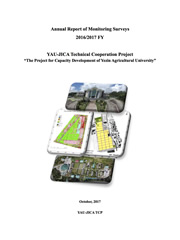
We attempted to grasp the basic information on YAU's education and research by the Baseline Survey conducted immediately after the project started, After that, we conducted the first monitoring survey from November 2016 to March 2017 to continuously collect the current status of education and research at YAU over time. We published the final report "Annual Report of Monitoring Survey 2016/17 FY" at the beginning of this month. The report contains questionnaires and summary results as an appendix so that it can be used as a basic data book on YAU education and research.
Each chapter and content is as follows.
- Introduction
- Monitoring Surveys on Education
2-1. Internship Program of Final Year Students (2015/2016 Academic Year)
2-2. Perception of Students on Education System
2-3. Perception of Teaching Staff on Education System
2-4. Students' Perception of Courses - Monitoring Surveys on Research
3-1. Research Activities of YAU Academic Staff and Graduate Students
3-2. Annual Report of Pilot Research Program - Job Opportunity and Destination of YAU Graduates
- Questionnaire Survey on YAU Academic Staff's Time Use
2. Training Course "Agricultural Economics" by Prof. Takahashi, Short Term Expert
Professor Akio Takahashi (Institute of Advanced Studies on Asia, University of Tokyo) was dispatched as a short-term expert from November 5 to December 5, Prof. Takahashi has rich experience about Myanmar conducted a survey on attitude toward curriculum reform including using Myanmar language for teachers and students, in the first half of his assignment. In the latter half, he conducted lecture style training on the history of agricultural policy and transition of rural economy from the Burmese style socialism by military government onward. And it was field practice in villages in Meiktila Township, Mandalay for the survey in rural area on 25th November.
Also a lecture "Brief History of Agricultural Policy and Changes of Village Economy in Myanmar" as the Monday Seminar of YAU to be held for all faculty members, graduate students and 4th year students on 20th November.
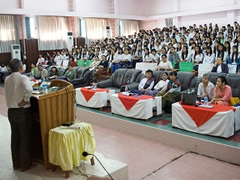 Prof. Takahashi at Monday Seminar (@Auditorium, 20th Nov)
Prof. Takahashi at Monday Seminar (@Auditorium, 20th Nov)
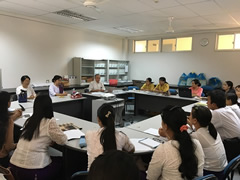 Opening Ceremony of the Course (@TCP Meeting Room, 20th Nov)
Opening Ceremony of the Course (@TCP Meeting Room, 20th Nov)
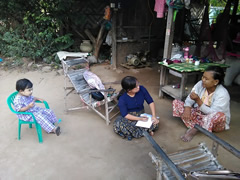 Field Practice (@Meiktila 25th Nov)
Field Practice (@Meiktila 25th Nov)
3. Training Course "Analytical Chemistry" by Dr. Masuda Short Term Expert
The Training Course "Analytical Chemistry" by Dr. Hiroyoshi Masuda, special researcher, Ishikawa Prefectural University in which a second course in this year continued in July was held for 3 weeks from 5th to 25th November. As in the previous course, it aimed to promote the use of analytical instruments provided by Japanese Grant Aid Project to each department and to activate research activities by academic staff in YAU.
The course focused on operational practice of 1) Real Time PCR, 2) Spectrophotometer and 3) Atomic absorption spectroscopy. The protocols were created by each participant from concerned department and it became a big step toward promoting the use of the equipment.
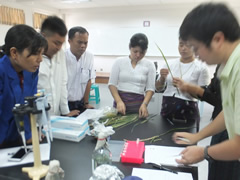 Practice on Real Time PCR
Practice on Real Time PCR
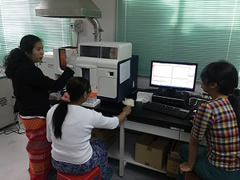 Practice on AAS
Practice on AAS
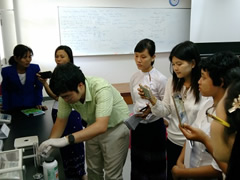 Practice on Spectrophotometer
Practice on Spectrophotometer
4. Dispatch of Trainees to Graduate School of Agriculture, Kyoto University
Mr. Arkar Minn, Head of Department of Agricultural Machinery and Ms. Ei Ei Win Maung Assistant Lecturer of Department of Animal Science, who are dispatched to Graduate School of Agriculture, Kyoto University returned YAU on 23rd November. At the joint evaluation meeting of the course in Kyoto University, the trainees introduced the contents of each training and its effectiveness, and expectation for feedback to education and research in YAU. There was a supplementary explanation from the trainers in charge of training.
They will deliver presentation about the training in monthly regular meeting of the project in December.
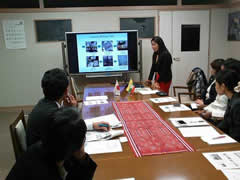 Presentation by Ms. Ei Ei Win Maung
Presentation by Ms. Ei Ei Win Maung
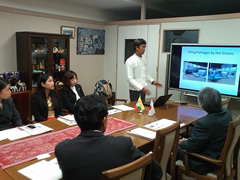 Presentation by Mr. Arkar Minn (at Graduate School of Agriculture, Kyoto University on 22nd November)
Presentation by Mr. Arkar Minn (at Graduate School of Agriculture, Kyoto University on 22nd November)
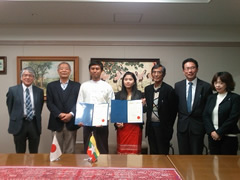 The conferment of certificates
The conferment of certificates
5.Chief Advisor's change
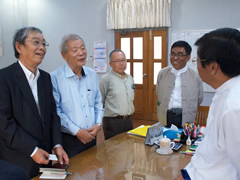 Courtesy call to Deputy Minister, MOALI (16thNov)
Courtesy call to Deputy Minister, MOALI (16thNov)
Prof. Atsushi Yoshimura, Faculty of Agriculture, Kyushu University, traveled to YAU from 12th to 17th in order to take over the duties of Chief Advisor from Prof. Koji Tanaka who had completed his assignment on 21st November and to participate related events and courtesy calls.
Prof. Yoshimura, New Chief Advisor will be officially dispatched on 10th December.
6. Introducing of new curriculum
The entrance ceremony of new first year students who study by new curriculum based on credit system was held on 14th November.
The necessity of curriculum reform in undergraduate education has been pointed out by the project through various opportunities such as regular meetings, short term trainings and others. Short-term expert training by Professor Shigeru Hayakawa (Kagawa University) at the end of last fiscal year has also introduced examples of curriculum reforms in Japanese universities and encouraged YAU to consider it. At the preface of the distributed subject introduction booklet (Yezin Agricultural University Undergraduate Handbook for First Year, B. Agr. Sc. Degree), the contribution of the project to the curriculum reform has been mentioned "This new curriculum was developed with the suggestions from Japanese experts of YAU-JICA TCP". We will support YAU to modernize the curriculum continuously through the project activities.
In the next few years, YAU will carry out courses with two curriculums in parallel as transition period.
7. Implementation of Pilot Research
1) Research groups under the Pilot Research Program conducted fieldworks as follows.
- 1st-2nd, 18th-19th November:
RB01-3 group conducted survey on Mung Beans in Nay Pyi Taw area. - 5th, 11th, 18th, 26th November:
11月5, 11, 18, 26日: - RB03-1 group collected insects in 7 Townships in Nay Pyi Taw.
- 6th-7th November:
CR07 group conducted preliminary survey in Bago TS, Thanapin TS, Kawa TS and Taunggoo TS in Bago. - 6th – 10th, 18th, 28th – 30th November:
RB01-1-1 group conducted preparatory study on the cultivation of pulses in Thonegawa TS, Yangon. - 13th – 17th November:
CR07 group conducted preliminary survey in Pyay TS in Bago. - 17th November:
RC02-1 group began to manage mango plants in experimental farm in Kyaukse TS, Mandalay. - 20th – 27th November:
CR01-2 conducted survey on supply chain of sesame in Aunglan TS, Magway. - 22nd – 23rd November:
CR-04 group conducted survey on the growth of deep water rice cultivated with peculiar local method (stem-cutting transplanting method) in Thanapin TS, Yangon. - 22nd – 24th November:
CR07 group conducted preliminary survey in Shwebo TS, Sagain and Mandalay city.
Laboratory and in-farm experiments were also conducted as follows
- RA01-1-1(Plant Breeding, Physiology and Ecology group)
The group completed experiments and will write paper. - RA01-1-2(Agronomy group)
The team continues to investigate yielding abilities and other indicators of the varieties (90% completed). - RA01-2 (Soil and Water Science group)
The team continues to grow rice varieties and strains which were provided by RA01-1 group to screen the salt-tolerant ones. - RA02-1(Plant Pathology group)
Pathogens of rice blast and leaf blight collected in Zaya Thiri and Pyinmana were continuously cultured. And the team cultivates 94 varieties and strains of rice harvested by RA01-1 group to investigate disease tolerance. - RA02-2 (Entomology and Zoology group)
The team cultivated 93 rice varieties and strains harvested by RA01-1 group both in paddy field and pots to investigate tolerance against yellow stem borer. However, this experiment faces difficulty of continuation due to unexpected floods in the experimental farm caused by heavy rain and long-lasting discharge of the reservoir. - RB01-2 (Soil and Water Science group)
The team has measured N, P, K of collected 80 sample soils and completed to measure K. - RB03-1(Entomology and Zoology group)
- Toward making a pest-warning model, the team continues activities to identify and count pests collected by insect net.
- RC-01-1 (Agronomy group)
The team analyses collected data and prepares the paper. - RC-02-2 (Plant Pathology group)
The group continues to cultivate pathogens isolated from the infected mango fruits. - CR-04 (Plant Breeding, Physiology and Ecology group)
Report writing is still ongoing. The group also continues the surveys on the growth of deep-water rice grown both in the DAR experimental pond and the fields in the deep-water area in Thanatpin TS, Bago.
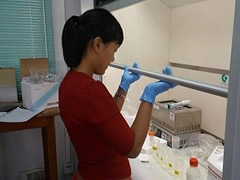 Schreening collected samples (RB01-2 group)
Schreening collected samples (RB01-2 group)
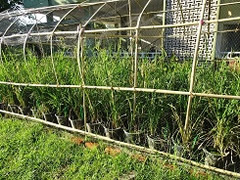 Investigate tolerance against yellow stem borer (RA02-2 group)
Investigate tolerance against yellow stem borer (RA02-2 group)
- About JICA
- News & Features
- Countries & Regions
- Our Work
- Thematic Issues
- Types of Assistance
- Partnerships with Other Development Partners
- Climate Change / Environmental and Social Considerations
- Evaluations
- Compliance and Anti-corruption
- Science and Technology Cooperation on Global Issues
- Research
- JICA Development Studies Program / JICA Chair
- Support for the Acceptance of Foreign HRs / Multicultural and Inclusive Community
- Publications
- Investor Relations
